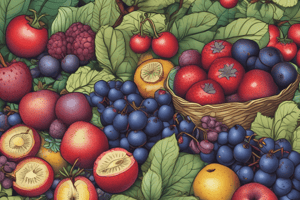Podcast
Questions and Answers
What is a common cultural association with apples?
What is a common cultural association with apples?
- Wisdom and health
- Joy and happiness
- Strength and vitality
- Knowledge and temptation (correct)
Which family do apples belong to?
Which family do apples belong to?
- Fabaceae
- Citrus
- Rosaceae (correct)
- Rutaceae
What makes apples a popular snack choice?
What makes apples a popular snack choice?
- Chewy texture and tangy flavor
- Crunchy texture and sweet flavor (correct)
- Crumbly texture and spicy flavor
- Soft texture and sour flavor
Where were apples first domesticated for consumption?
Where were apples first domesticated for consumption?
What is the approximate calorie content of a medium-sized apple?
What is the approximate calorie content of a medium-sized apple?
Which vitamin is found in significant amounts in apples?
Which vitamin is found in significant amounts in apples?
What health benefits are associated with consuming apples, according to the text?
What health benefits are associated with consuming apples, according to the text?
What is the potential benefit of apple extract mentioned in the text?
What is the potential benefit of apple extract mentioned in the text?
In what season do the flowers bloom to develop apples?
In what season do the flowers bloom to develop apples?
What is one common culinary application of apples mentioned in the text?
What is one common culinary application of apples mentioned in the text?
Which apple variety is known for its tart flavor?
Which apple variety is known for its tart flavor?
How do farmers determine the right time to harvest apples?
How do farmers determine the right time to harvest apples?
Study Notes
Apples: Nutritious and Delightful Fruits
Apples are round fruits belonging to the Rosaceae family and are widely cultivated worldwide due to their versatility and numerous health benefits. They come in various shapes, sizes, and colors, with red, green, yellow, and black being the most common. Apples are popular for their crunchy texture and slightly sweet flavor, making them a favorite snack among people of all ages. This article explores the background, nutrition, and cultural significance of apples.
History and Cultural Significance
Apples have been part of human culture for thousands of years. Their origins trace back to Central Asia, where they were first domesticated for consumption. Over time, apples spread to Europe, North America, and other parts of the world, leading to the development of countless varieties. Today, apples are grown in countries like China, the United States, and France, with China alone producing approximately half of the total global yield.
In popular culture, apples are associated with knowledge and temptation, thanks to the biblical story of Adam and Eve. Additionally, apples are featured in many proverbs, such as "An apple a day keeps the doctor away," emphasizing their health benefits.
Nutrition and Health Benefits
Apples are a good source of fiber, vitamins, and minerals, particularly potassium and vitamin C. One medium-sized apple provides roughly 95 calories, 25 grams of carbohydrates, and 2.4 grams of dietary fiber. A study published in the Journal of Agricultural and Food Chemistry found that apple extract possesses antioxidant activity and can slow down the oxidation process, potentially reducing the risk of chronic diseases.
Moreover, apples have been linked to improved cardiovascular health, decreased risk of cancer, and enhanced brain function. Some studies suggest that consuming apples daily may help lower cholesterol levels, reduce the risk of developing type 2 diabetes, and improve lung function.
Varieties and Uses
There are hundreds of apple varieties, ranging from tart and firm to sweet and soft. Some of the most popular ones include Granny Smith, Fuji, Gala, Golden Delicious, and Red Delicious. Apples are used in various culinary applications, such as baking pies and cakes, making sauces and chutneys, or simply eaten raw. They can also be processed into juice, jams, and dried fruits.
Cultivation and Harvesting
Apples grow on trees that require a cool climate to thrive. The fruit develops from the blooming of flowers during springtime. Ripe apples typically turn red, yellow, or green depending on their variety. Farmers usually harvest apples when they reach full maturity but still have some firmness, ensuring optimal flavor and texture.
In conclusion, apples are a delightful fruit with numerous health benefits and cultural significance. Their versatility makes them suitable for various culinary uses, appealing to people worldwide. As research continues to uncover more about these nutritious fruits, it is likely that we will discover even more reasons to enjoy apples as part of our daily diet.
Studying That Suits You
Use AI to generate personalized quizzes and flashcards to suit your learning preferences.
Description
Test your knowledge on the history, nutrition, health benefits, varieties, and uses of apples in this quiz. Explore the cultivation and harvesting methods of apples worldwide while learning about their cultural significance and impact on human health.




